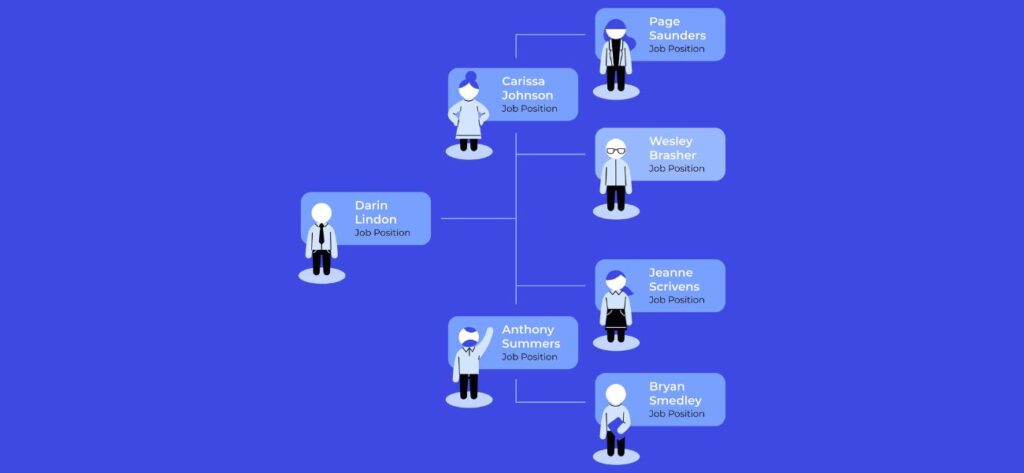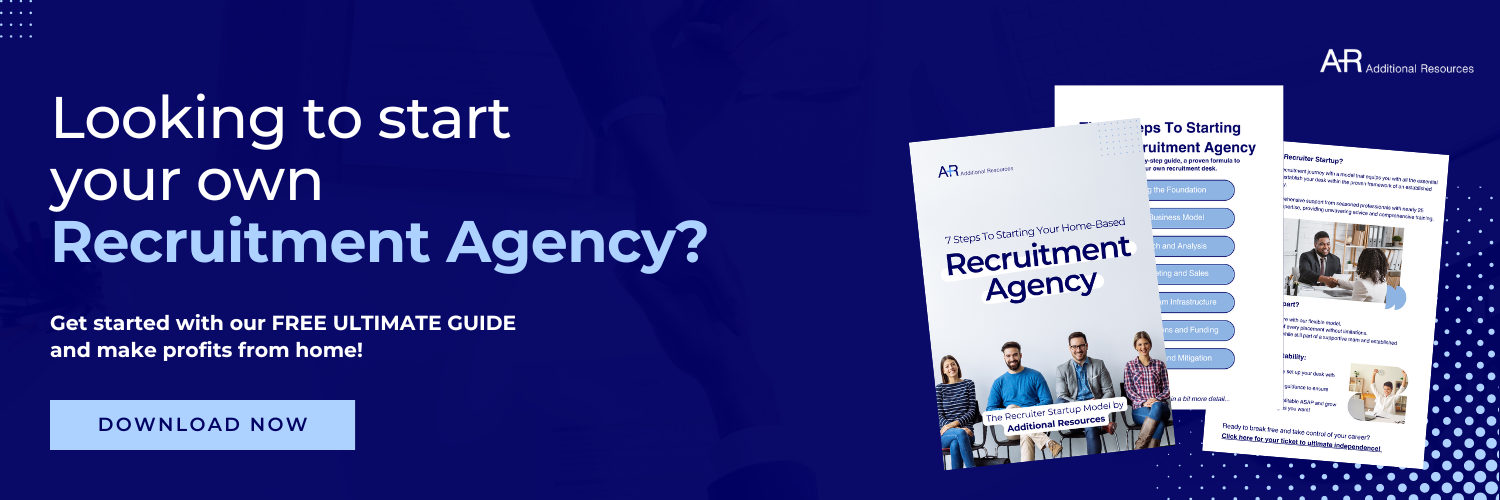So you’re looking to break into the world of recruitment but unsure of the best option for growth. You have a tough choice between opting for the traditional recruitment agency organisational structure or starting your recruitment desk from home.
Going solo as a recruiter lets you do things your way without answering to anyone. You get to keep a significant share of the profits and set your schedule — no more long commutes or rigid office hours. You could simply roll out of bed and start recruiting in your PJs.
Sure, joining an agency means less risk and hassle. They’ll handle the admin, and you can tap into their client network and brand. However, you’ll always be a small fish in a big pond, following their rules and processes.
For the ambitious recruiter, starting your desk from home is the way to go. The rewards of being the master of your destiny far outweigh the hurdles, and with our associate recruitment model, you can reduce the risks.
Exploring the Traditional Recruitment Agency Hierarchy
The traditional recruitment agency structure follows a model where recruiters report to a team leader or manager, who reports to a director and so on up the chain of command. As an employee in this structure, you can expect a basic salary, commission on placements, and various benefits.
While working in a traditional recruitment agency can provide stability and a steady income, there are some limitations to consider. One significant burden is that the agency typically takes much of the placement fees. This can significantly impact your earning potential, as a substantial portion of the fees goes to the agency rather than directly to you.
Being aware of these limitations is essential when considering a career in traditional recruitment agencies. However, it’s worth noting that this structure may vary across different agencies, as some may have different commission structures or additional incentives in place.
If you’re looking to maximise your earning potential as a recruiter, it could be beneficial to explore alternative options, such as working as a franchise recruiter with Recruiter Startup or joining a recruitment firm with a more favourable fee-sharing arrangement. These alternatives may offer more flexibility and potentially higher earnings.
Ultimately, deciding which path to pursue depends on your preferences and career goals. It’s always a good idea to thoroughly research and consider all options before deciding.
Recruitment Agency Organizational Structure: The Traditional Model vs. Starting a Recruitment Desk
The typical/traditional recruitment company structure follows a pretty standard model. As a recruiter, you’re usually hired as an employee and work your way up the ladder to senior recruiter or manager. This means less freedom and a smaller share of the profits.

On the other hand, launching your recruitment desk allows you to be your boss. You get to keep the lion’s share (80–90%) of placement fees and have the flexibility to work from anywhere — no corporate policies or limitations on your growth and earning potential.
With the right tools and support, starting a recruitment desk is easier than ever. Companies like Recruiter Startup provide everything you need to get up and running from home.
Namely, we offer the following:
- Guaranteed job leads to work on per month (at least three). No more cold calling!
- Comprehensive training to help you master the latest recruitment techniques.
- A user-friendly applicant tracking system and CRM to manage your candidates and clients.
- Back-office support to handle contracts, invoicing, and compliance issues so you can focus on recruiting.
- A community of like-minded recruiters to connect with.
- Most importantly, you earn 80–90% of each placement fee. Talk about motivation!
While joining an established agency certainly has its perks, starting your recruitment desk offers freedom and financial rewards traditional agencies can’t match. With the right tools and support, leaping to becoming your boss could be one of the best career moves you can ever make. Contact us today to learn more!
Traditional Recruitment Team Roles and Responsibilities
In a traditional recruitment agency, various teams and roles contribute to the operation’s overall success and are as follows:
- Recruiters
- Client managers
- Researchers
- Administrative support team

Understanding these roles can help you grasp your earning potential and the job functions of each position.
Let’s explore each role below:
Recruiters
As a recruiter, you’ll play a vital role in the recruitment agency’s operations. You’ll be responsible for sourcing and identifying qualified candidates, managing the recruitment process, and ultimately making successful placements.
Client Managers
Client managers serve as clients’ primary point of contact, understanding their hiring needs and managing the recruitment process. This role requires strong communication and relationship-building skills, and the pay range will be higher than that of a recruiter.
Researchers
Researchers play a crucial role in supporting recruiters by conducting thorough searches across professional networks, job sites, and candidate databases. Their efforts help identify potential candidates who align with the agency’s requirements. As a recruiter, you can leverage the insights and prospect lists provided by researchers to engage with candidates more effectively and streamline the recruitment process.
Administrative Support Team
Behind the scenes, the administrative support team ensures the smooth functioning of the recruitment desk. Administrative assistants are vital in maintaining efficiency and organisation, from scheduling interviews and managing paperwork to handling data entry. This support allows recruiters to focus on their core responsibilities and maximise productivity.
Generally, this is the highest career growth for a recruiter working in a traditional agency, and you’re limited to your monthly payroll.
Why Start Your Recruitment Desk?
There are many benefits to creating your recruiting team structure rather than joining an existing agency, including the following:
- You keep more of the profit: You can keep most (80–90%) of the placement fees when you start your recruitment desk. Traditional agencies typically take a considerable chunk, leaving you with a meagre monthly take-home. By cutting out the middleman, you’ll earn significantly more per placement.
- You set your hours: Working for yourself means setting your schedule. You can work the hours that suit you and even work from home. No more commuting or rigid 9–5 schedule! This flexibility allows you to achieve an optimal work-life balance.
- Opportunity to build your brand: As an independent recruiter, you can create your brand and style. Focus on the industries and roles you know best; over time, you’ll become known as an expert in your speciality areas. Candidates and clients will come to you naturally.
- Low costs to get started: The costs to launch a recruitment desk are minimal — you only need a phone, computer, internet connection and a website. The associate recruitment model at Recruiter Startup offers everything else, like CRM software, training and leads, to get you up and running quickly.
- Unlimited growth potential: When working for an agency, your income and responsibilities are often capped. However, with your recruitment desk, the sky is the limit — you can scale and grow your business as big as you want, bringing on new recruiters and opening new locations. In essence, you can build an empire!
While joining an established recruitment agency certainly has benefits like job security, starting your recruitment desk offers much more freedom and earning potential. You can build a successful business on your terms with hard work and persistence. The rewards of being your boss are worth it — sign up today on Recruiter Startup to get started.
How to Build a Successful Home-Based Recruitment Desk
Starting your home-based recruitment desk has many benefits over joining a rigid recruitment company structure. You get to be your boss, work flexible hours, and earn a more significant share of the profits. However, it does take work to build up a successful desk.

Here are four tips to get you off the ground:
- Focus on a niche: Choose a specific industry or job function to focus on, like IT, healthcare, or finance. Develop expertise in that area through research and on-the-job experience. Clients and candidates will come to you as a trusted specialist.
- Build your network: Start connecting with people in your target industry. Start by joining relevant LinkedIn groups and online communities and attending industry events. Get to know HR managers and candidates as well. A strong network will lead to new clients and help you find the best people to fill roles.
- Provide excellent service: Go above and beyond for your clients and candidates. Be responsive, meet deadlines, and communicate regularly while building a reputation for being helpful, honest and reliable. Satisfied clients will use your services again and refer others.
- Keep learning: The world of recruitment is constantly changing, so you must stay up-to-date with the latest trends, technologies, and strategies. Recruiter Startup offers the ideal resources for home-based recruiters; take advantage of these opportunities to improve your skills and better serve your clients. Continuous learning and development will help ensure the long-term success of your desk.
With time and persistence, you can build a thriving home-based recruitment desk. Follow these tips, leverage Recruiter Startup’s tools and support, and you’ll be well on your way to finding job satisfaction and financial freedom. The sky’s the limit; register your CV now to get started!
The Role of Positive Candidate Experience in Building a Successful Recruitment Agency Structure
Candidate experience refers to a candidate’s overall perception and journey throughout the recruitment process. It encompasses every interaction a candidate has with your desk, from the initial application to the final hiring decision.
Here’s why a positive candidate experience is crucial to establishing a successful recruitment agency structure:
- Attracting Top Talent: A positive candidate experience can help attract top talent to your organisation. In today’s competitive job market, candidates have options and are more likely to choose companies that prioritise their experience. You can stand out and draw in high-quality candidates by providing a seamless and engaging recruitment process.
- Employer Branding: Candidate experience plays a crucial role in shaping your employer brand. Every candidate interaction is an opportunity to showcase your desk’s values, culture, and commitment to a positive employee experience. A well-managed recruitment process can enhance your employer brand, making your organisation an attractive choice for top talent.
- Word-of-Mouth Referrals: Candidates who have a positive experience are more likely to share their experience with others, including friends, family, and professional networks. This can lead to word-of-mouth referrals and positive reviews about your recruitment desk, which can be invaluable for attracting future candidates. According to a recent survey, 93% of respondents trust recommendations from family and friends.
- Talent Pipeline: Prioritizing candidate experience can help build a strong talent pipeline. Even if candidates aren’t the right fit for a current role, they may be an excellent fit for a future opportunity. By leaving a positive impression and maintaining a relationship with candidates, you can tap into this talent pool when new positions arise.
- Retention and Employee Engagement: Candidate experience doesn’t end with the hiring decision — a positive experience sets the foundation for a candidate’s employee journey. When candidates have had a smooth and respectful recruitment process, they’re likelier to feel engaged and motivated as employees. This can contribute to higher retention rates and a more satisfied workforce.
- Reputation Management: In today’s digital age, candidates have the power to share their experiences online through platforms like Glassdoor and social media. A negative candidate experience can harm your business reputation and deter potential candidates from applying through you. By prioritising candidate experience, you can proactively manage your online reputation and maintain a positive image.
- Continuous Improvement: Paying attention to candidate experience allows you to identify areas for improvement in your recruitment process. Gathering feedback from candidates and analysing their experiences can help you make data-driven decisions to enhance your strategy and make it more efficient and candidate-friendly.
In summary, candidate experience is vital for attracting top talent, building a positive employer brand, and maintaining a strong talent pipeline. By prioritising candidate experience throughout the recruitment process, you can create a positive impression, enhance your reputation, and, ultimately, secure the best talent for your recruitment desk.
FAQ: Recruitment Agency Organisational Structure
What Is the Hierarchy of a Recruiter?
The hierarchy of a recruiter typically involves recruiters reporting to a team leader or manager, who then reports to a director or higher-level management.
What Is the Difference Between an Employment Agency and a Recruitment Agency?
An employment agency and a recruitment agency both connect job seekers with job opportunities. Still, one subtle difference between the two is that while the former focuses on matching candidates with short-term positions, the latter focuses on permanent roles.
An employment agency typically focuses on placing candidates in temporary or short-term positions. They may specialise in specific industries or job types and often handle tasks such as screening candidates, conducting interviews, and coordinating placements. Their primary objective is to find suitable candidates to fill immediate job vacancies.
On the other hand, a recruitment agency generally focuses on permanent or long-term placements. They work closely with client companies to understand their hiring needs and then actively seek out qualified candidates to fill those positions. The recruitment team’s roles and responsibilities involve hiring, including sourcing candidates, conducting in-depth interviews, and assisting with negotiations between the candidate and the employer.
While there may be some overlap in the services provided by employment and recruitment agencies, the main distinction lies in the duration and nature of the positions they typically deal with. See our guide on employment agency vs. recruitment agency for more details.
What Is the Highest Position in Recruitment?
The highest position in the field of recruitment varies depending on the organisational structure and the specific terminology used by different companies. However, a few common high-level positions can be found in many recruitment agencies or departments, such as the Director of Recruitment (or Head of Recruitment) and the Vice President (or Chief Recruitment Officer).
The Director of Recruitment or Head of Recruitment oversees the entire recruitment function within the organisation. They set strategic goals, manage the recruitment team, and ensure the recruitment process is efficient and effective.
In larger organisations with a more diversified recruitment agency structure, there may be additional executive-level positions in recruitment, such as Vice President or Chief Recruitment Officer. These positions involve a higher level of responsibility and may involve overseeing recruitment operations across multiple regions or divisions.
How Many Roles Can a Recruiter Manage?
The number of roles a recruiter can manage depends on various factors, including the complexity of the roles, the industry, the size of the organisation, and the recruiter’s level of experience and efficiency.
In general, recruiters can handle multiple roles simultaneously. However, there’s no fixed limit as it can vary widely. Some recruiters may handle a smaller number of specialised roles that require extensive sourcing and screening, while others may manage a larger volume of more standardised roles.
Effectively managing multiple roles relies on the recruiter’s organisational skills, time management abilities, and familiarity with the industry and job requirements. Recruiters must balance quantity and quality, ensuring they can provide adequate attention and effort to each role they manage.
Organisations may also have their guidelines or expectations regarding the workload and capacity of their recruiters. They may provide support systems, such as recruitment software or additional team members, to help manage larger volumes of roles.
Ultimately, the number of roles a recruiter can manage will vary based on various factors, and recruiters must assess their capabilities and workload to ensure they can effectively serve their clients and candidates.
Conclusion
Navigating the recruitment agency’s organisational structure may not be your best option when pursuing a career in recruitment. You have to scale through multiple positions to the top, and a fixed salary means your earning potential is limited. However, working as a franchise recruiter allows you to be your own boss without the hassle. You have the flexibility to work at your hours, and a higher placement fee means there’s no limit to how much you can earn. If you want to start your recruitment journey immediately, contact us to guide you.


